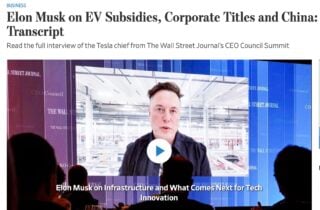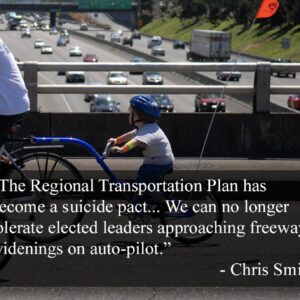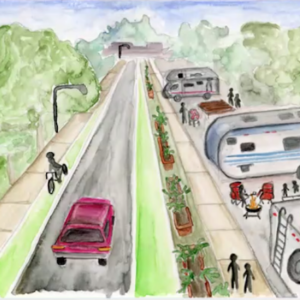
There’s a Dutch saying that goes something like: “Government forced cars on us. Now we need the government to get rid of cars so then we can get rid of the government.” Last week, Elon Musk (who looked a lot like the villian from The Fifth Element) gave an interview to the Wall Street Journal in which he laid out a hypocritical view of the government’s role in transportation. The government, he claimed, should not be subsidizing anything. Asked about the Democrats’ transportation and social bill, he said it would be better if they did not pass.
Mr. Musk can correctly point out that if he hadn’t run an electric car company, it would have taken longer for electric cars to be a thing. But he cannot take all the credit. In Norway, electric cars make up 20% of all cars on the road, and accounted for 90% of cars bought last month. Norway stands out in this achievement compared to other countries because they offer massive government subsidies for electric cars. The first and fourth top selling cars in Norway are Teslas.
In the interview, Mr. Musk went on to say that the government shouldn’t give any subsidies to anyone for anything, including fossil fuels. The role of the government should only be to “referee” the market. His argument is that society would move better without the force of the government interfering in the market. In the same interview he also called for double-decker freeways and tunnels to counter “extreme traffic”.
In so many ways, the costs of cars are passed on to others. A “free market” does not take this into account.
This got me thinking about what our society would look like if we completely stopped subsidizing cars. From parking mandates that require you build a certain number of car parking spaces, to single-detached zoning which makes everything far away and requires most people to have to own a car to get around, to the social subsidy from a loss of community and isolation. What is the cost of our children’s lost freedom because cars are always threatening them? In so many ways, the costs of cars are passed on to others. A “free market” does not take this into account.
Advertisement
If we did get to a place where people paid the true cost of cars, I think we would have a much better society. I would also bet that a lot more people would ride bicycles in cities, because they are simply the best way to get around.
By calling attention to government subsidies, Musk is calling attention to all the ways our society pays for driving. Many years ago, I was waiting in line to testify against the original Columbia River Crossing bridge and talking with a self-described libertarian whose entire car was covered in Ron Paul stickers. He could not see that this massive public freeway project he was about to testify in favor of was the government interfering in the market. In the end, I guess most of us are just self-interested and can only reason so far.
In a society as complex as ours, having a representative democracy that can at least try to account for these costs might be the best solution we have. Yes, let’s subsidize electric bikes! Yes, let’s build double-decker bike lanes! Both have many positive social outcomes that are not accounted for by markets. In the long run, both of these things will make us less reliant on the government and better people too.
There is a better way to move ourselves than only in cars. But it will require a lot more good government to get us there. In the long run, we will build an urban bike utopia because cars, even electric ones, require too many finite resources. Also in the long run we will all be dead from climate change. So, before that happens let’s use good government policy to make this world a nicer place to live!
Got an opinion? Email jonathan@bikeportland.org and we’ll consider posting it here.







Thanks for reading.
BikePortland has served this community with independent community journalism since 2005. We rely on subscriptions from readers like you to survive. Your financial support is vital in keeping this valuable resource alive and well.
Please subscribe today to strengthen and expand our work.
That’s an interesting stat regarding electric cars in Norway. Interesting because they pay for all those electric cars with their North Sea oil money.
Kiel, look to the true evil in the world please. We subsidize oil $11M per minute. Oil companies and their billionaires own the GOP, infiltrated our govt, skewed voting and sent our tax payer $ and kids to oil wars. It’s time to stop belittling the few folks doing something to stop them. The Dems sure aren’t. We’re going to need all options, fast as possible. Musk here was referring specifically to the Dem bribe of UAW in EV incentives. HE DOESN’T WANT EV INCENTIVES EITHER. Full context is important, there are legions of sullied interests spreading as much marketing/disinformation/FUD as possible about those and the things disrupting them.
I actually think it would be better if we had more Elon Musks! Nothing would make me happier than if Yozo Shimano (ceo of shimano) becamse the world’s wealthiest man from all the subsidies we give bikes.
The problem with this sort of conversation is that what counts as a “subsidy” is impossible to agree upon. Some people will list things like the military, “single family housing” and “children’s lost freedom” as subsidies for cars, which strikes me as a specious attempt to make a point by defining terms.
Ultimately, this discussion is tiring because it’s about definitions and line drawing, rather than the more interesting issue about making good public policy, or ways we can, in practice, internalize the many costs we externalize as a society.
And yes, Musk can take a huge amount of credit for transforming the way Americans see electric cars (you don’t think the Norwegians did that, do you?). You may not like his politics (I don’t), but he has done more good for the world than almost anyone else.
The Norwegians couldn’t have done it without Elon Musk, but Elon Musk would not have sold nearly as many cars without the Norwegian government 🙂
Good policy is based on thoughtful considerations of the ways we internalize the many costs we externalize as a society. I wish we did that more with cars.
I wish we did too. We need a national carbon tax!
As for Norway, I’m glad their transition has been rapid and successful. They have shown it is possible to shift away from fossil fuels (ignoring how their transition was funded) without upending society. If Tesla made money helping make that transition more palatable, good for them.
I’ve noticed that just about every single policy you propose in the comments would benefit wealthy people and harm low income people.
Do you really believe the crushing inequity in this society is sustainable?
(Market-based incentives in the context of this grossly unequal society are just another delaying tactic to avoid MANDATES.)
Untrue. The particular implementation of a carbon tax that I prefer would return much of the proceeds to the people as a flat payment. As long as you emit less than average, you’d make money.
I favor a carbon tax because I believe it is the policy most likely to achieve what we need to do in terms of reducing carbon emissions. As things go south, inequality is only going to grow.
And yes, I prefer incentives to mandates. I’m anti-fascism.
Mandates that ban machine guns: Fascism?
Mandates on lead in drinking water: Fascism?
Vaccine mandates: Fascism?
Ecocidal emissions mandates: Fascism?
Experience shows that we just don’t do mandates very well, and that even simple and obvious ones have proven highly divisive and controversial. Mandates all across the economy to limit carbon emissions? I can’t imagine that proving workable. A carbon tax is much simpler, can be implemented equitably, and is one of the very few things economists have near consensus about.
Weaning us off fossil fuels will be a bit more complex and intrusive than removing lead from drinking water or banning machine guns.
Carbon taxes are a policy that might have helped us to limit global heating to 2 C several decades ago. Anyone proposing them now is essentially arguing that it’s OK to exceed 2 C in warming.
As are those arguing for economy-wide “mandates” if they are politically impossible to implement. We can’t even get a Democratic controlled house/senate/presidency to take concrete steps. How are mandates going to be enacted when the Republicans control the House and Senate (as they likely will in 2023).
Maybe if you were clearer about what you meant by “mandate”. Telling folks “no more cars allowed” is clearly a non-starter. Possibly picking a date where we phase out gasoline (like we did with leaded gas) might work, accompanied by a “cash-for-clunkers” type program to soften the blow. But even then, the timeline would have to be so long, we might as well go with a carbon tax (or do both).
Multiply a mandate like that over the entire economy… how do you expect it to work (especially if you are including all sorts of “equity carve-outs” and “fairness exceptions”)?
This is a start but must be paired with a rapid investment in transportation alternatives. Mandates are an acknowledgement that we need system change, not more milquetoast “delay and pray” reform.
The track record of carbon taxes/pricing is disastrous because they place the onus on individual behavior change rather than system change. This makes user/consumer taxes large enough to actually make a difference a political impossibility. Funding system change via increased government spending and mandated private sector spending is far more politically palatable.
https://iopscience.iop.org/article/10.1088/1748-9326/abdae9/meta
What would these “alternatives” look like, that would, at a systems level, be significantly less energy consumptive than what we currently have?
Clearly more buses everywhere isn’t the answer (we can’t even run the ones we have, and running a fleet of mostly-empty buses would be extremely wasteful).
Does taxing carbon even have a track record? Europe has a convoluted trading scheme that was poorly implemented, with initial prices far too low, and buying “offsets” seems pretty dubious in most cases.
The paper you cited seems to focus on carbon permit trading schemes, which are not carbon taxes as traditionally understood. They have so many loopholes and quirks that I’m not surprised they’ve been minimally effective.
A real carbon tax would likely be much more effective in this regard, with less room for cheating and a more direct line between CO2 emissions and cost.
I know that Musk nor his stans have any shame but of all his hypocritical positions, arguing the government shouldn’t incentivize certain products has got to be his worst. Absolute joke of a human being.
He’s basically a parody at this point. I’d suggest he play himself on SNL, but he’s already done that…
His position now is literally the most rational position he can take. If you are competing with the big three, two of which we have subsidized at one time or another to a great extent, then why would he want to assist his competition in getting a benefit he does not?
I can’t imagine considering someone an “absolute joke of a human being” who managed to create a car company in California that actually produces cars in California at a price that people all over the country can buy. When people take this position I always wonder how many pairs of Nike’s they own. What would Oregonians say about Phil Knight if instead of paying for a cancer institute he had shoes made by Oregonians instead of children in SE Asia.
He didn’t create Tesla, he bought it. The cars his company produces are only ‘affordable’ because of massive federal welfare and even then are far too expensive for most working class Americans to afford. Electric vehicle subsidies are literally just wealth transfers to the rich.
Phil Knight has received tons of criticism. I’m not sure what rock you’ve been hiding under.
“When you talk about truly affordable cars, which Tesla has yet to make—their $35,000 Model 3, nowhere to be found. $35,000 is the median new car price in the U.S. Actually, it’s gone up a little bit to about $40,000. Tesla has never made a car in the bottom half of the average price range of American cars. It’s not just that they don’t have their operational efficiency or the design chops to do it, which I think is a big part of it. But also because the values that have succeeded so well for Tesla are unique to the premium segment. And it’s like a Jaguar or a Ferrari. These are not the most reliable cars, the most efficient cars, the easiest cars to repair, the most affordable total cost of ownership, any of those things. But they’re Ferrari and Jaguar. They play in a premium segment.”
-https://www.currentaffairs.org/2022/01/exposing-the-fraudulence-of-elon-musk-and-tesla
This sums up everything about humans. I think it so sad that most people just seem incapable of seeing any farther than their fingertips.
Is Musk saying it’s okay for government to tax the rich?
I have a Tesla Model 3, but I bought it in 2019 before Elon showed his true colors of being a complete jerk. I’ll never buy another Tesla.
It must be exhausting doing all the due diligence on the behaviors of each CEO of each company you purchase things from.
A simple rule of thumb is to avoid buying from USAnian firms.
Sure is…but what’s your point?
It looks like there will be no subsidy for Teslas or e-bikes:
https://www.bloomberg.com/news/articles/2021-12-19/manchin-says-no-to-biden-agenda-blaming-inflexible-democrats
It’s incredible to me people are buying into the big lie that electric cars are the best route. See dynamite tesla for reference. I can buy a small car today, use it for 200K miles or even more, change out the engine for perhaps 5K along with the transmission and run it for 100K miles more or even more. Depending on the rest of the car (which is the same with electric) it could run for a quarter century.
An electric battery today Tesla charges 23K for a replacement. We told you so. E cars are just a more expensive version for car makers to charge more and entrap better.
Congrats America. Meet the new boss. A whole more expensive than the old boss.
Maybe it’s not “the big lie”. Maybe different people have different needs which are served by different solutions. I expect most Tesla buyers are aware of the battery issue.
Maybe they are aware, but maybe they also have banked on a fraudulent “battery-swap” concept: https://www.currentaffairs.org/2022/01/exposing-the-fraudulence-of-elon-musk-and-tesla